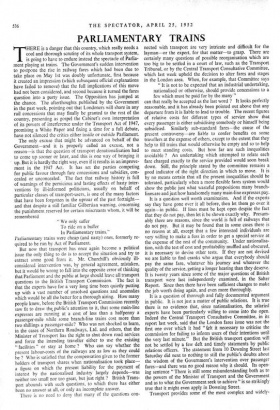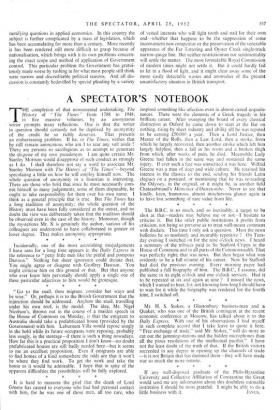PARLIAMENTARY TRAINS T HERE is a danger that this country, which
really needs a cool and thorough scrutiny of its whole transport system, is going to have to endure instead the spectacle of Parlia- ment playing at trains. The Government's sudden intervention to postpone the rise in railway fares which had been due to take place on May 1st was doubly unfortunate, first because it created an impression (which subsequent official explanations have failed to remove) that the full implications of this move had not been considered, and second because it turned the fares question into a party issue. The Opposition has jumped at the chance. The afterthoughts published by the Government in the past week, pointing out that Londoners will share in any rail concessions that may finally be granted to the rest of the country, presenting as gospel the Cabinet's own interpretation of its powers of interference under the Transport Act of 1947, promising a White Paper and fixing a time for a full debate, have not silenced the critics either inside or outside Parliament.
The only excuse that might be advanced on behalf of the Government—and it is properly called an excuse, not a reason—is that the question of transport denationalisation had to come up sooner or later, and this is one way of bringing it up. But it is hardly the right way, even if it results in an improve- ment in the 1947 Act. It has set the parties competing for public favour through fare concessions and subsidies, con- cealed or unconcealed. The fact that railway history is full of warnings of the pernicious and lasting effects of hasty inter- ventions by ill-informed politicians, usually on behalf of particular classes of transport-users, is one of the many factors that have been forgotten in the uproar of the past fortnight— and that despite a still familiar Gilbertian warning, concerning the punishment reserved for certain miscreants whom, it will be remembered " We only suffer To ride on a buffer In Parliamentary trains."
Parliamentary trains were cheap (and nasty) ones, formerly re- quired to be run by Act of Parliament.
But now that transport has once again become a political issue the only thing to do is to accept the situation and try to extract some good from it. Mr. Churchill's obviously ill- considered intervention was, by general agreement, mistaken, but it would be wrong to fall into the opposite error of thinking that Parliament and the public at large should leave all transport questions to the British Transport Commission. The fact is that the experts have for a very long time been quietly putting up with a vast number of unsolved questions and anomalies which would be all the better for a thorough airing. How many people knew, before the British Transport Commission recently saw fit to draw the, public's attention to it, that some main-line expresses are running at a cost of less than a halfpenny a passenger-mile while some branch-line trains cost more than two shillings a passenger-mile? Who was not shocked to learn, in the cases of Northern Roadways, Ltd. and others, that the Minister of Transport has the right to shut down road services and force the intending traveller either to use the existing " facilities " or stay at home ? Who can say whether the present labour-costs of the railways are as low as they could be ? Who is satisfied that the compensation given to the former holders of transport shares when nationalisation took place— a figure on which the present liability for the payment of interest by the nationalised industry largely depends—was neither too small nor too great, but just right ? British Trans- port abounds with such questions, to which there has either been no answer at all, or only an incomplete answer.
There is no need to deny that many of the questions con- nected with transport are very intricate and difficult for the layman—or the expert, for that matter—to grasp. There are certainly many questions of possible reorganisation which are too big to be settled in a court of law, such as the Transport Tribunal, or by the Central Transport Consultative Committee, which last week upheld the decision to alter fares and stages in the London area. When, for example, that Committee says " It is not to be expected that an industrial undertaking, nationalised or otherwise, should provide concessions to a few which must be paid for by the many " can that really be accepted as the last word ? It looks perfectly reasonable, and it has already been pointed out above that any departure from it is liable to lead to trouble. The recent figures of relative costs for different types of service show that every passenger is either subsidising somebody or himself being subsidised. Similarly sub-standard fares—the cause of the present controversy—are liable to confer benefits on some travellers at the expense of others, except to the extent that they help to fill trains that would otherwise be empty and so to help to meet standing costs. But how far are such inequalities avoidable ? An undertaking which attempted to relate each fare charged exactly to the service provided would soon break down. Still, the principle stated by the committee remains a good indicator of the right direction in which to move. It is by no means certain that all the present inequalities should be tolerated, particularly when a more flexible fares system would show the public just what wasteful propositions many branch- lines are and just how handsomely many main-line expresses pay.
It is a question well worth examination. And if the experts say they have gone over it all before, then let them go over it again—in public. If lines must be kept open despite the fact that they do not pay, then let it be shown exactly why. Presum- ably there are reasons, since the world is full of railways that do not pay. But it may be found that in some cases there is no reason at all, except that a few interested individuals are very willing to make a fuss in order to get a special service at the expense of the rest of the community. Under nationalisa- tion, with the test of cost and profitability muffled and obscured, it is necessary to devise other tests. If they are not devised we are liable to find cranks who argue that everybody should pay the same fare, whatever his journey and whatever the quality of the service, getting a longer hearing than they deserve. It is twenty years since some of the major questions of British transport were last independently examined, in the Salter Report. Since then there have been sufficient changes to make the job worth doing again, and even more thoroughly.
It is a question of thorough and fully documented argument in public. It is not just a matter of public relations. It is true there is no evidence that, since nationalisation, the salaried experts have been particularly willing to come into the open. Indeed the Central Transport Consultative Committee, in its report last week, said that the London fares issue was not the first one over which it had " felt it necessary to criticise the commission for failing to inform users of their intentions until the very last minute." But the British transport question will not be settled by a few deft and timely statements by public relations officers. The statement from 10 Downing Street last Saturday did next to nothing to still the public's doubts about the wisdom of the Government's intervention over passenger fares—and there was no good reason why it should. Its open- ing sentence " There is still some misunderstanding both as to the powers of the Minister of Transport and the Government and as to what the Government seek to achieve " is so strikingly true that it might even apply in Downing Street.
Transport provides some of the most complex and widely-
ramifying questions in applied economics. In this country the subject is further complicated by a mass of legislation, which has been accumulating for more than a century. More recently it has been rendered still more difficult to grasp because of nationalisation, which brings with it its own problems concern- ing the exact scope and method of application of Government control. This particular problem the Government has gratui- tously made worse by rushing in for what most people still think were narrow and discreditable political reasons. And all dis- cussion is constantly bedevilled by special pleading by a variety of vested interests who will fight tooth and nail for their own end—whether that happens to be the suppression of some inconvenient new competitor or the preservation of the venerable apparatus of the Far Tottering and Oyster Creek single-track narrow-gauge line. But neither restrictionism nor sentimentality will settle the matter. The most formidable Royal Commission of modern times might not settle it. But it could hardly fail to let in a flood of light, and it might clear away some of the more easily detectable wastes and anomalies of the present unsatisfactory situation in British transport.



































 Previous page
Previous page